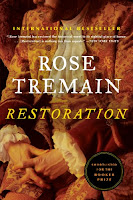Under Charles, Britain rushes to embrace the new mania for personal gain and all things shallow and showy. Robert Merivel reflects this mania, and in fact, seeks to be an exemplar of his time. You could say, without fear of contradiction, that he accomplishes this. I would dare to say that his reverses do nothing to alter our opinion—he’s still an exactly typical man of court. We meet him while he’s studying anatomy at Cambridge. This discipline he falls out of in short order: his father is glove maker to the King, and he brings Robert and introduces him to His Majesty. Robert is overwhelmed in the Royal presence, physically ill and unable to stand and present himself appropriately. Thus does Charles’s presence affect him through the entire book.
By her own account, Tremain wrote Restoration during the 1980s as an indictment of Thatcher’s greedy and preening England. It feels even more timely today, a mirror to modern Western consumerism and income inequality run amok. It remains on point, it exhibits Tremain’s unflagging skill in evoking a time and place, and focuses its first-person energy on a highly entertaining, and at times even sympathetic, character.


















No comments
Post a Comment